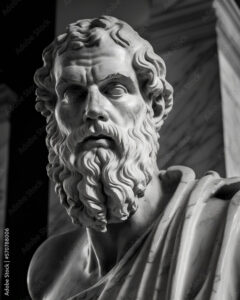Did you ever “go ballistic,” or “blow your top” with such steam that someone had to “scrape you off the ceiling”? Have you ever “festered” with resentment, “nursed” a grudge, or “come unglued” in LA gridlock? Do some people so rub you the wrong way that they make you “fly off the handle”? Did you ever lay the blame on someone else for how you feel?
There is a powerful idea, first stated by a Greek philosopher almost 2000 years ago, that can help you avoid such reactions. In one of the key psychological insights of all time, Epictetus made this simple but profound observation: “People are disturbed not by things or events, but by their views of them.” This is one of the most liberating insights about human nature ever revealed, for it means that it is always within our power to decide how we shall react to anything. Yes, anything!

The idea that something must make you feel a certain way is reflected in a model that you may have learned about in a psychology class or book. It’s called the S-R model of behavior—Stimulus-Response—meaning that the stimulus causes the response. A notable example of S-R is the classic experiment performed by the Russian scientist Pavlov. After conditioning a dog to associate food with the ringing of a bell, Pavlov had only to ring the bell to cause the dog to salivate.
What the S-R model misses is the crucial step between stimulus and response wherein we exercise our power of choice. We can consciously access this step by using what I call an SOS: a short Sabbath of Silence.
One way to do this is to make a Countdown to Silence . . . When you catch yourself “going negative,” simply stop and slowly count down: 3-2-1-0. When you reach “0,” the “Oh” (like a circle) is a symbol of silence and also points to the “O” of Options. Placing an O in S-R yields S-O-R and reminds you that in any situation you always have options.
By taking this stand, we own our own power rather than surrendering it to circumstances or other people. I sometimes think of this as mental and emotional Aikido—whereby we can “throw” our problems, rather than being thrown by them.
Psychologist Victor Frankl, a POW during World War II, used this idea to transcend the almost unimaginable brutalities of a Nazi concentration camp. He wrote: “The sort of person the prisoner became was the result of an inner decision, and not the result of camp influences alone.” Admiral James Stockdale, a POW for eight years in Vietnam, credits his survival to lessons he learned from his readings of the classics, mainly Epictetus. If this idea is so powerful it works in a concentration camp, think how well it can work with the hassles of everyday life!
I’ll close with a summation by Epictetus:
“When, therefore, we are hindered, or disturbed, or grieved, let us never blame anyone but ourselves; that is, our own judgments. It is the action of an uninstructed person to reproach others for his own misfortunes; of one entering upon instruction, to reproach himself; and of one perfectly instructed, to reproach neither others nor himself.”
HyC